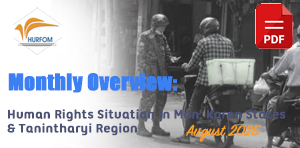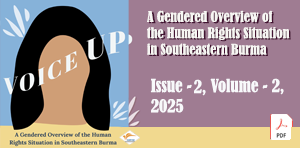Myanmar Human Rights Commission and the Release of Political Prisoners is Welcomed, but More Progress is Demanded
October 19, 2011
Since taking power as head of Burma’s new civilian government, President U Thein Sein has endeavored to show positive change in his country to the international community and especially to Western governments.
First, he proposed amnesty laws and tried to release political prisoners. Due to the past oppression by the State Peace and Development Council (SPDC)led by Senior Gen. Than Shwe, which held power until the 2010 November elections, there were over 2,200 political prisoners in various prisons with notorious reputations across the country.
However, the current government still did not classify them as “political prisoners”. And among the recently-released 6,000 prisoners, only 200 were political prisoners. Although international governments and Amnesty International (AI) welcome such progress, they maintain that the government must release more political prisons if it is sincere about transitioning to democracy.
The government has tried to show its ‘openness’ to the world, and it has since lifted restrictions on internet access to certain websites and even allowed the domestic media to write about Daw Aung San Suu Kyi. However, some activists who were charged under the Electronic Laws still languish in prison. If there is real media openness in the country, those prisoners should be released.
The government also formed the “Myanmar National Human Rights Commission” to show it is serious about respecting the human rights of Burmese citizens. The newly formed human rights body also announced that any citizen of Burma, who felt their rights had been violated can submit their case(s) to the commission and identify themselves. However, having suffered violations for decades, citizens are weary to report abuses. By their memory, whenever they fought for their human rights, they faced detention or worse. The people still doubt whether they can trust the current government’s human rights body or not.
There are still many political prisoners whose only crime was fighting for the fundamental human rights of Burmese citizens. Labour rights activists and those who fought for freedom of expression – political rights and civil rights – are still under detention; and if the government really wants to show respect for human rights, these political prisoners must be released.
If Burma’s government and President Thein Sein are really sincere about a democratic transition, they must release more political prisoners. And the newly-established human rights body should not do only ‘lip service’ towards human rights protection, but must scrupulously do what it takes to create a free, fair, and safe Burma. They must set up a proper framework of educating communities about human rights, meet with human rights victims, andhold public forums on past human rights abuses as well as set up plans for protection in the future. They also must push for training of law enforcement to respect human rights within the law. An amendment should be made to the 2008 Constitution that stipulates the government must uphold all basic human rights principles regarding political, civil, social, economic, and cultural rights. To fund the body, government must allocate sufficient budget for the Myanmar National Human Rights Commission to protect basic human rights. Finally, the human rights body must be independent from the government and the Burmese Army.
Comments
Got something to say?
You must be logged in to post a comment.



















































